Starting an online store is a daunting process, to say the least. And if you don’t have any technical experience, it can be even more difficult to know where to start.
Fortunately, there are plenty of platforms that make it easy for beginners like you to start an online business without the technical barriers. We’ve done the due research and gathered the easiest and the best ecommerce platforms for beginners in this blog.
We will also show you what to consider from an ecommerce platform to quickly set up an online store. So, let’s get into it!
What to Consider When Choosing an Ecommerce Platform
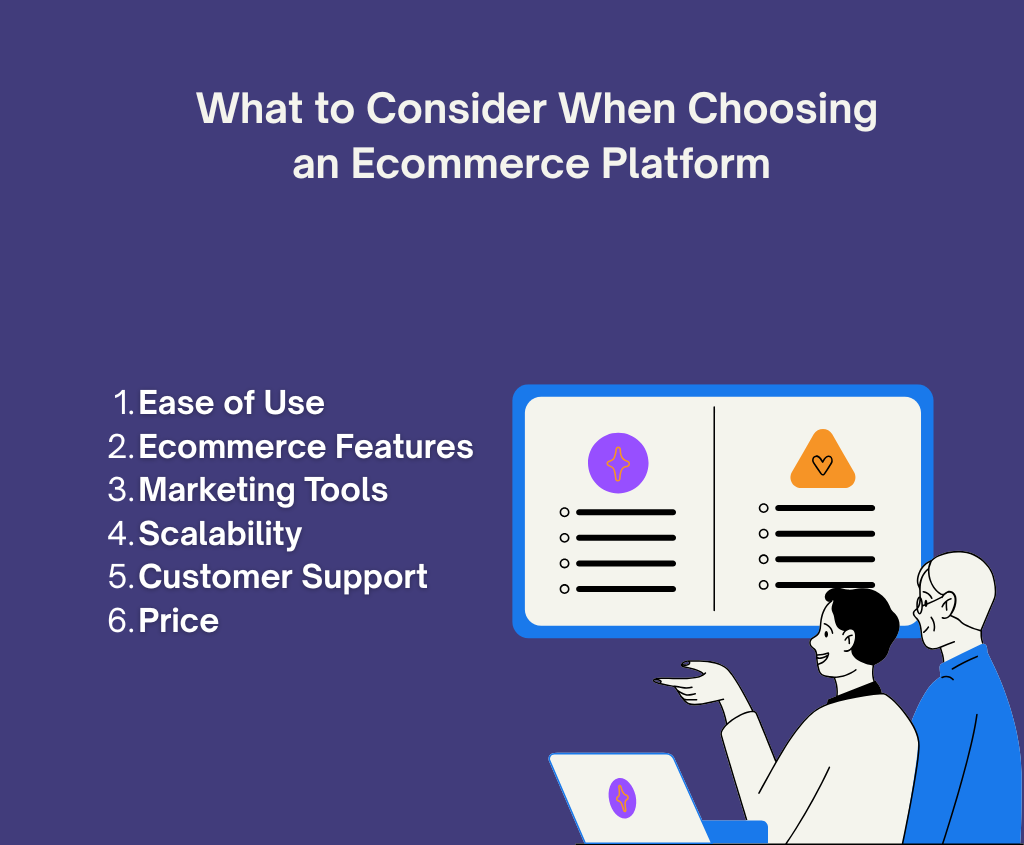
If you’re a beginner with ecommerce, you may not know what to look out for when choosing a platform. Don’t worry, we’ve narrowed down everything you need to know, so keep reading to find the perfect ecommerce platform for you!
1. Ease of Use
When it comes to the best ecommerce platform for beginners, user experience is everything. Let’s face it, setting up an online store is not easy, and if you don’t have any previous experience, it’s easy to feel lost.
So, you need a platform that’s easy to navigate, loads fast, and looks attractive. As the admin, you should be able to change settings and update issues without confusion.
Look for an intuitive dashboard, drag-and-drop design tools, and clear instructions.
2. Ecommerce Features
At the very least, your platform should let you add products, manage inventory, and process payments securely.
But some extras can make a big difference, like abandoned cart recovery (to bring back lost sales), multi-currency support (if selling internationally), and mobile-friendly designs (since many shoppers browse on phones).
If you plan to sell digital products, subscriptions, or memberships, check if the platform supports those too.
3. Marketing Tools
You could have the best products, but if no one finds your store, sales will be slow. Built-in SEO tools help your store rank higher in search results. Email marketing integrations, social media selling options, and discount code features can also help attract and retain customers.
Some platforms also offer AI-powered product recommendations to boost sales, which can be nice if you’re not a marketing expert yet.
4. Scalability
Right now, you might just need a basic online store, but what happens when you start getting more traffic and sales? A good platform should handle growth smoothly, whether that means adding more products, integrating with third-party tools, or expanding to new sales channels (like Amazon or Instagram).
Avoid platforms that lock you into rigid plans, forcing you to migrate later (which can be a hassle).
5. Customer Support
Even the simplest platforms can have hiccups. When something goes wrong (like a payment glitch or a broken checkout), you’ll want quick help. Check if the platform offers 24/7 live chat, email, or phone support.
Some platforms have extensive knowledge bases, video tutorials, and active user communities, which are great for DIY problem-solving.
6. Price
Different ecommerce platforms have different pricing models; some charge a monthly fee, others take a cut of your sales, and a few do both. Watch out for transaction fees, payment gateway costs, and extra charges for plugins or themes.
Many platforms offer free trials or low-cost starter plans, so you can test them before committing. Just make sure the pricing scales reasonably as your store grows.
6 Ecommerce Platforms for Beginners: A Quick Guide
Starting an online store has never been easier, thanks to beginner-friendly platforms that handle the technical stuff for you. No matter what you’re selling, these six options balance simplicity with essential features to get your store up and running quickly.
1. EasyCommerce
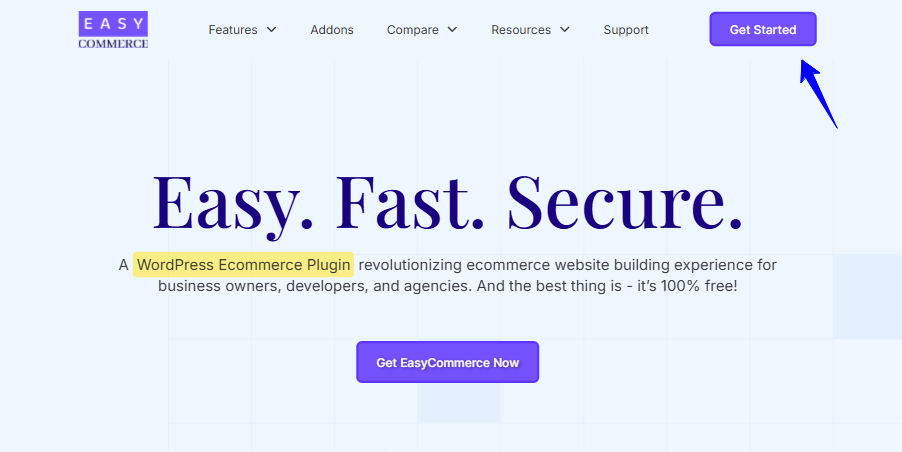
Best for: Small businesses and solopreneurs who want a straightforward, no-fuss setup.
Why beginners love it:
EasyCommerce keeps things simple with a clean interface and minimal learning curve. You can set up a basic store in minutes, customize your design with easy drag-and-drop tools, and start selling without worrying about complex settings. It includes essential features like inventory management, secure checkout, and basic analytics.
And with dedicated addons for payment gateways, marketing, and advanced features to add to your store, EasyCommerce has everything a new store owner needs to get started.
The platform also includes basic but crucial features like order tracking and customer management, all presented in a clean, uncluttered interface designed not to overwhelm new users.
- Price: The core plugin is completely free. However, you may need to pay for hosting, domain, and addons.
- Downside: It lacks some advanced marketing tools, so you may need to install third-party tools for it.
2. Shopify
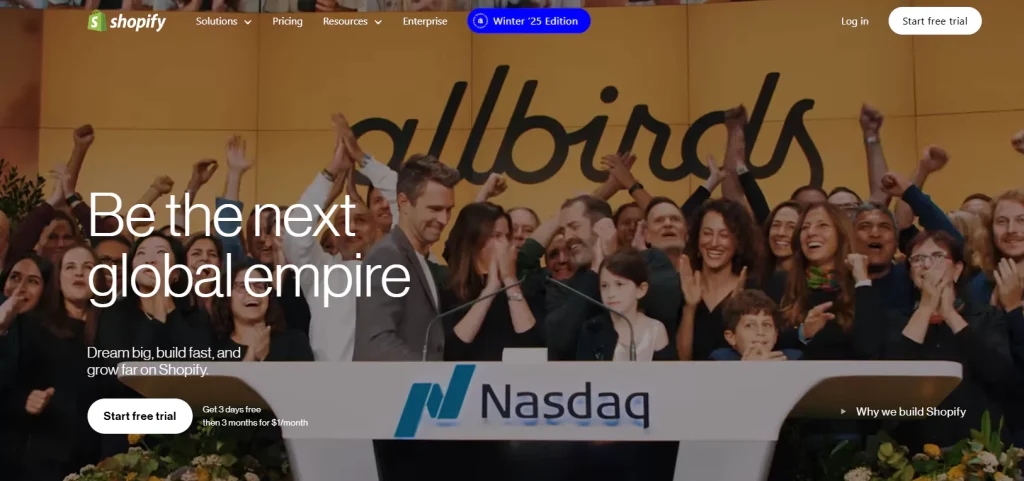
Best for: Entrepreneurs who want an all-in-one solution with room to grow.
Why beginners love it:
Shopify is one of the most popular ecommerce platforms for a reason: it’s powerful yet user-friendly. Even if you’ve never built a website before, you can create a professional-looking store using customizable themes.
It handles hosting, security, and payments (including Shopify Payments to avoid third-party transaction fees). Plus, the app store has thousands of add-ons for marketing, shipping, and more.
- Pricing: Starts at $19/month (with a 3-day free trial), which includes everything you need to launch.
- Downside: Costs can add up with premium apps and themes, but the trade-off is flexibility.
3. Big Cartel
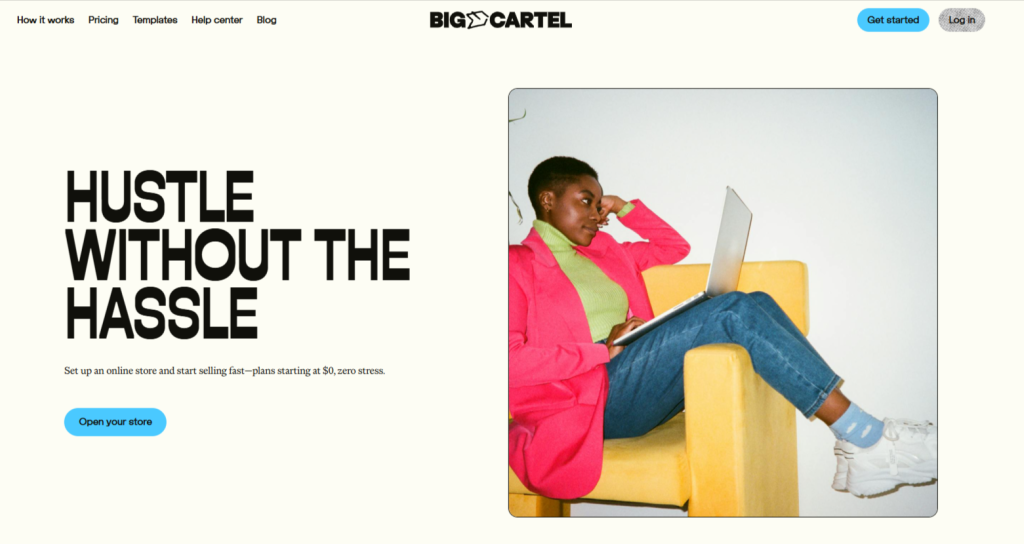
Best for: Artists and small-scale sellers with a limited product range.
Why beginners love it:
Big Cartel feels like it was made specifically for creative entrepreneurs. The platform understands that artists want to focus on their craft, not on complicated ecommerce systems. The interface is also beautifully minimal, just upload your products, customize your look, and you’re ready to sell.
What we appreciated most is how it handles decision fatigue. Instead of overwhelming you with dozens of settings and options, you will only get what you need to sell your work online. The built-in tools for product pages (like zoom features and multiple image displays) are perfect for visual items.
Plus, the pricing is based on the number of products you list, so you don’t have to pay for features you’ll never use.
- Pricing: Free for up to 5 products; paid plans start at $15/month
- Downside: Not suitable for large or complex inventories
4. Wix Ecommerce
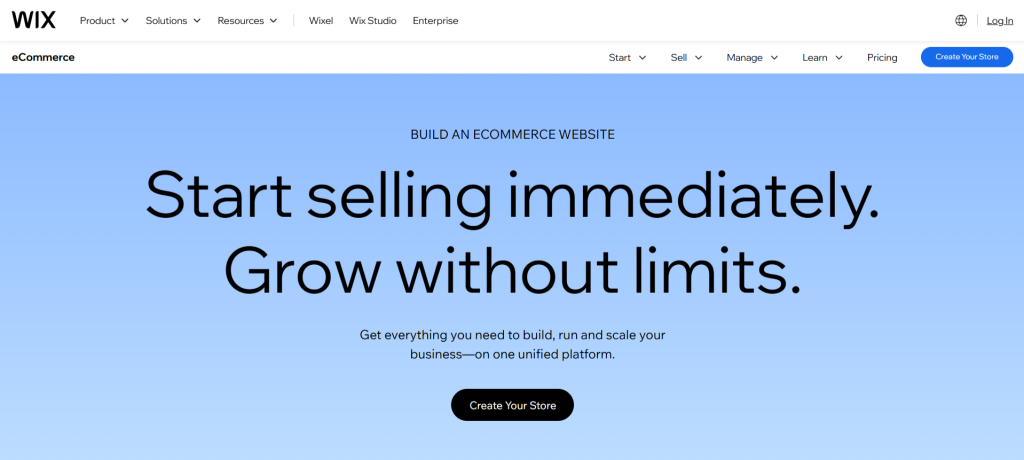
Best for: Beginners who want design flexibility.
Why beginners love it:
Wix’s ecommerce platform took their already famous website builder and added powerful selling tools for beginners who want complete creative control. The drag-and-drop editor is also incredibly intuitive, so you literally place elements anywhere on the page and see changes in real-time.
One of the best parts about Wix is that it makes professional designs accessible. Even if you have zero design experience, you can create a store that looks custom-built.
It also has smart ecommerce features like abandoned cart recovery and product videos that let beginners like you compete with more established stores.
- Pricing: Starts at $17/month for basic features.
- Downside: Less scalable for high-volume stores.
5. Squarespace Commerce
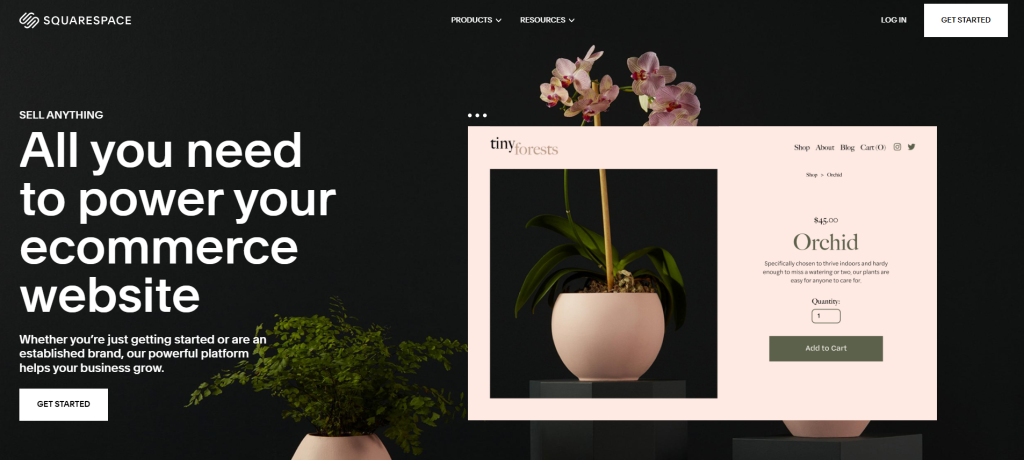
Best for: Creatives and brands that want beautiful, design-focused stores.
Why beginners love it:
Squarespace Commerce is great if you want beginner-friendly ecommerce tools with stunning aesthetics. The platform is especially popular for its gorgeous, professionally designed templates that make any store look high-end from day one.
What really makes it great for beginners is the visual editing experience, which means you can see exactly how changes look as you make them.
It’s an all-in-one platform that handles everything from hosting to payments, and includes useful features like inventory management, customer accounts, and built-in SEO tools. Using third-party apps can add to the overall costs, and act like bloatware, so Squarespace integrated marketing tools for email campaigns and social media integrations to make it easier for newcomers.
Also, all of their templates are mobile-friendly, and they have a mobile editor that ensures your store looks perfect on any device.
- Pricing: Starts at $16/month (when paid annually)
- Downside: Less flexible than Shopify for complex stores.
6. Ecwid
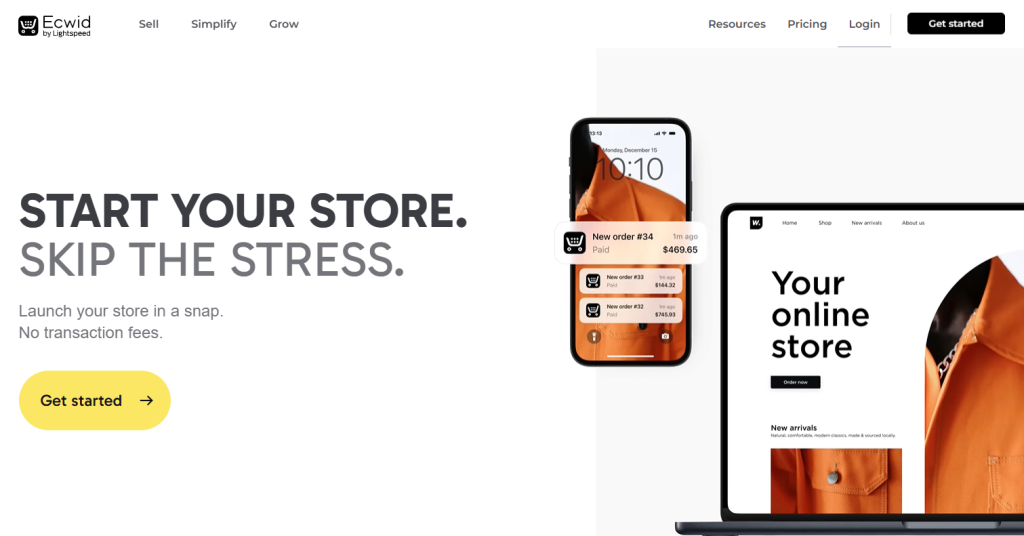
Best for: Adding shopping to existing websites or social media.
Why beginners love it:
If you didn’t already know, you can add a shopping option on your existing website, and Ecwid helps you do just that. You can add a store to any website, WordPress, Wix, Weebly, or even a custom site, without rebuilding anything. The setup is surprisingly easy; it takes just a few minutes, and the store automatically matches your site’s design.
It’s especially great if you want the flexibility of selling through multiple channels (your website, Facebook, Instagram, even in-person with their POS app) from one centralized inventory.
The free plan also gives you everything needed to start small, and you can also upgrade and scale as your business grows without needing to migrate to other platforms.
- Pricing: Free plan available; paid plans start at $15/month
- Downside: It’s not a complete standalone solution.
Wrapping Up
The best ecommerce platform for beginners depends entirely on your specific needs and goals. If you’re looking for the simplest possible setup, EasyCommerce has a no-fuss solution that’s perfect for small inventories.
Shopify is a versatile choice if you want room to grow with powerful features. Artists and makers love Big Cartel’s minimalist approach, and Wix’s ecommerce shines for design flexibility without technical headaches. And while Squarespace Commerce delivers stunning templates for visually-driven brands, if you already have a website, you can just add a shopping functionality with Ecwid.
The good news? Most of these platforms offer free trials or plans, so you can experiment risk-free. Remember that no platform is perfect – focus on finding the one that best matches your products, budget, and technical comfort level.
Frequently Asked Questions (FAQs)
What is the best ecommerce for beginners?
For absolute beginners, EasyCommerce stands out as the simplest solution with its intuitive one-click setup and minimal learning curve. Shopify is also relatively easy, but has more complex features you might not need initially.
Which platform is best for ecommerce?
EasyCommerce offers the perfect middle ground – it keeps things simple while including all essential selling tools. For those who anticipate rapid growth, Shopify provides more scalability. Wix works well if design flexibility is your priority.
Which ecommerce platform is most profitable?
EasyCommerce’s straightforward approach helps you start earning quickly with minimal setup time and lower initial costs. For advanced sellers, Shopify’s app ecosystem offers more profit-boosting tools.
What is the safest platform to sell online?
Shopify and Squarespace provide built-in security, SSL encryption, and fraud protection.
Which ecommerce model is best?
There’s no single “best” model, but popular options include:
- Dropshipping (low upfront costs, good for beginners)
- Print-on-demand (great for artists and designers)
- Private label (higher profit margins but requires inventory)
- Digital products (instant delivery, no shipping hassles)

